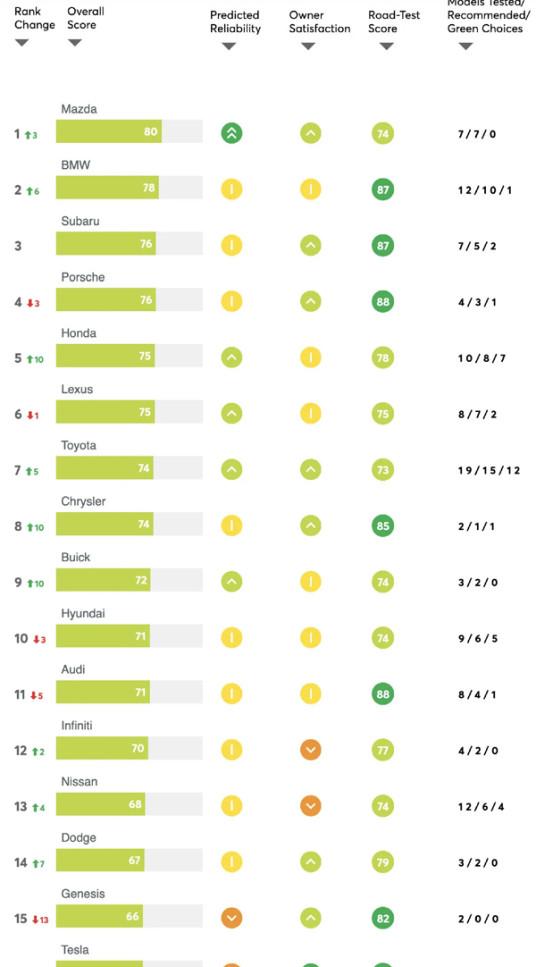All along, Japanese Toyota has been known for its reliability in the market, and it is also known as a Toyota that is not bad in the private sector. However, in the past two years, the situation seems to be gradually changing. In the car brand reliability survey released by the US authoritative organization Consumer Report, Toyota's ranking is declining, even falling to 12th in 2020, and although there is some progress in 2021, it only misses the top three, only to 7th, but the performance of Mazda, BMW and Subaru is surprising.

If someone says that the US car reliability survey is not suitable for the Chinese market, then we can also take a look at the Release of China's New Car Quality Survey List in 2021, in which GAC Toyota only got the fifth result, while FAW Toyota was the ninth. It can't be said to be very bad, but there is still a big gap with the argument that "Toyota drives three generations" and "opens Toyota will only add glass water". In terms of rankings, brands such as Changan and Chevrolet are still in front of Toyota.
In fact, Toyota has indeed been mired in quality turmoil in recent years, and in 2020 it has been questioned by the oil emulsification incident. In the second half of last year, Toyota issued three more large-scale recalls in China.
In June 2021, Toyota recalled more than 200,000 Corolla and Highlander vehicles due to the fact that some components of the internal components of the high-pressure fuel pump were not fully pressed, which may cause a fire risk.
In July 2021, due to the activation of the adaptive cruise system in part of the speed range of the system when the brake lights are not lit, which may cause rear-end rear-end collisions, more than 200,000 Corolla dual engines and Raling dual engines were recalled.
In December 2021, due to defects in the internal components of the engine exhaust gas recirculation valve, which may cause the engine to run poorly, and in extreme cases, the vehicle will even stop at low speeds, and the largest recall was issued, reaching 898,000 vehicles, including Willanda, C-HR, Camry, Yize, Asia Dragon and other models.
The vehicles involved in the three recalls cover almost all of Toyota's products, with a total number of 1.298 million vehicles, which should be regarded as the largest quality crisis that Toyota has experienced in the history of domestic automobiles, which is very exaggerated. To a large extent, this actually makes Toyota's TNGA architecture pushed to the cusp.
In the past, in all the promotional materials, it was only to emphasize the benefits of the TNGA architecture. Indeed, TNGA has given Toyota vehicles a great upgrade in terms of body rigidity, chassis texture, intelligent technology configuration, safety, and handling. For example, in terms of safety, in the crash test of China Insurance Research Institute, Models such as Leiling/Camry/Corolla/Yize/Willanda have achieved excellent results in "6G". In addition, in terms of production efficiency, there have also been great innovations, so in the past two years, we can see that Toyota's product launch speed has accelerated significantly.
Toyota has long pursued lean manufacturing methods to maximize profits. In the final analysis, the TNGA architecture is actually the embodiment of Toyota's pursuit of profits, just like the Ford Model T created an assembly line production model for automobile manufacturing, simplifying the production process and reducing the cost of bicycle manufacturing. As Toyota's new car-making concept TNGA architecture, the purpose is actually surprisingly consistent with Ford's purpose at that time, but also to improve production efficiency, reduce production costs, of course, the saved costs can continue to feed back to research and development and technology, and then make more money for Toyota, forming a virtuous circle.
We all know that cars are complex industrial products composed of tens of thousands of parts, and it is difficult to have commonality. However, the TNGA architecture breaks down many restrictions and barriers, allowing Toyota's models with the same platform to achieve 70-80% of the versatility of parts, which not only greatly improves product development efficiency, but also brings better cost control capabilities. But on the other hand, this also means that the quality control of parts and components needs more stringent standards, otherwise it is a risk of the whole body being wiped out. But now, Toyota still has a lot of room for improvement in quality control, otherwise there would be no three large-scale recalls last year.
From this point of view, the TNGA architecture does not seem to be as mythical as the legend, and the great benefits may actually mean greater drawbacks.
However, Toyota may not be concerned about the three recalls, and even announced not long ago that with the shortage of raw materials such as chips and rising costs, Toyota intends to use defective parts for new cars to solve the pressure caused by the shutdown of production lines. Toyota said this will not affect the performance and safety of the new car. Another meaning of this sentence should be to show that the model will not reduce the price of this, which will undoubtedly make consumers lose confidence in Toyota.
In addition, in the car complaint ranking released by the car quality network in December, Toyota's Raeling models also landed on the 5th place in the complaint list due to transmission setbacks, abnormal noises and other issues, and this series of events seems to point to one thing, Toyota's quality myth is going to be shattered. Perhaps, when we buy a car, we should also reflect on it.